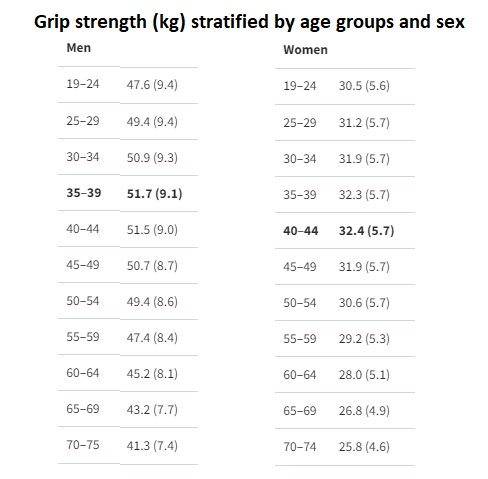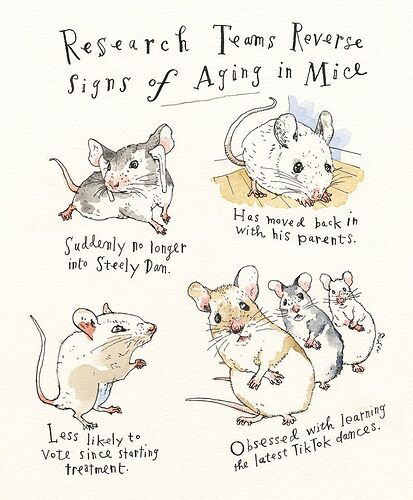I’m pretty sure you don’t need to bother with any of these tests if eg you can deadlift >1.5 body weight or if you are better than novice in any of the large compounds
I agree it is worth getting a good list of functional tests. I am not a fan of the chair sit stand test because for someone who is quite fit there is a lot of thrashing around. I think a range of challenges such as chin-ups etc is a better thing.
Grip strength is quite a good test. I wonder if it varies during the day.
I only do dead hangs but my time has increased 25% since taking Rapa.
What one can’t determine is if the improvement comes from Rapa or from the muscle exercise of doing the dead hang. (It wasn’t an exercise I did before taking Rapa).
I suspect it’s just the exercise as it always appears to fall back if I go more than a week without doing it.
It seems that A LOT of things seem to drop off at 40 (this is why there are so few elite athletes after that age)
I do not recommend any kind of deadlifting for older people. It simply compresses the spine. I believe this is why many older people have back problems, not simply because they may have been lifting wrong. I see many at the gym doing deadlifting wrong and I wonder how they are going to feel after a few years. So many of my friends have had back problems at an early age that it caused me to be extra cautious with my back. I do not do any exercises that put an excessive load on my spine and, at 82, have no back problems.
Yes. So few elite athletes above 40. A smaller number of the few maintain their plateaus till their 70s.
The late Ed Whitlock run the marathon in 2:54:48 at 73, and did a 39:25.16 10k in the 75-79 age group. A sub 3 hour marathon is below 7 minutes per mile, sustained for 26 miles.
Trying to finish the Rapamycin and risk of cardiovascular disease thread. I have not reached one-fifth (436 of 1363). But it is the most informative thread I’ve read in this forum.
Genesis Lung
Genesis Lung
I have been repeatedly saying that light cardio exercise with some low weight load is ideal for old people. People keep ignoring that weightlifting to get buff decreases muscle satellite stem cell health and the added vasculature strains your heart. You want just enough to ward off sarcopenia and get the benefits of musculoskeletal mechanical transduction and antioxidant release and lymph clearance, not more than that. This is what led to me cutting mass. Not to mention longevity interventions like metformin reduce your muscle gains by like 75% anyway.
2· Reply · 20h · EditedTomer Ze’ev
Genesis Lung
One wonders whether it’s a lack of satellite muscle cells or the harmful effects of uncontrolled inflammation and/or cellular senescence in other cell populations. Even when you’re 60 you have an ample amount of satellite cells, but they need to know when to start dividing, if the inflammation has reached unhealthy chronic levels it could be giving them the wrong signal. But yeah there’s quite a bit of evidence that being lean contributes to a longer life, especially lower levels of IGF-1, that’s part of the benefit in caloric restriction.I have been repeatedly saying that light cardio exercise with some low weight load is ideal for old people. People keep ignoring that weightlifting to get buff decreases muscle satellite stem cell health and the added vasculature strains your heart. You want just enough to ward off sarcopenia and get the benefits of musculoskeletal mechanical transduction and antioxidant release and lymph clearance, not more than that. This is what led to me cutting mass. Not to mention longevity interventions like metformin reduce your muscle gains by like 75% anyway.
2· Reply · 20h · EditedTomer Ze’ev
Genesis Lung
One wonders whether it’s a lack of satellite muscle cells or the harmful effects of uncontrolled inflammation and/or cellular senescence in other cell populations. Even when you’re 60 you have an ample amount of satellite cells, but they need to know when to start dividing, if the inflammation has reached unhealthy chronic levels it could be giving them the wrong signal. But yeah there’s quite a bit of evidence that being lean contributes to a longer life, especially lower levels of IGF-1, that’s part of the benefit in caloric restriction.
I’ve always assumed the whole grip strength thing is simply a marker for overall body strength. For example, if I can squat 400lbs and bench 300 and can run a six minute mile (BTW, I can’t do any of these things), but my grip strength isn’t great does that mean I’m out of shape? Doesn’t make sense/
Of course not, if you had no hands they couldn’t be used as an indicator of your health. Grip strength is merely a surrogate measure of frailty. Grip strength is an indicator of all-cause mortality because of the myriad of things it represents; namely sickness and frailty.
In addition, poor grip strength might prevent recovery from falling, such as grabbing a handrail. Lifting heavy weights requires good grip strength, but you will gain grip strength from lifting even modest weights.
Yes, I used the word “marker” but “a surrogate measure of frailty” is a much more elegant way of putting it. My point is that if that’s true, using a grip strengthening device to improve grip strength but not improving whole body strength does nothing except possibility help slightly with blood pressure.
I agree improving grip strength alone would not necessarily improve health, but it might help prevent some falls.
A new paper on this topic (open access paper):

Grip strength values and cut-off points based on over 200,000 adults of the German National Cohort - a comparison to the EWGSOP2 cut-off points
Background
The European Working Group on Sarcopenia in Older People (EWGSOP) updated in 2018 the cut-off points for low grip strength to assess sarcopenia based on pooled data from 12 British studies.
Results
Grip strength increased in the third and fourth decade of life and declined afterwards. Calculated cut-off points for low grip strength were 29 kg for men and 18 kg for women. In KORA-Age, the age-standardised prevalence of low grip strength was 1.5× higher for NAKO-derived (17.7%) compared to EWGSOP2 (11.7%) cut-off points. NAKO-derived cut-off points yielded a higher sensitivity and lower specificity for all-cause mortality.
Conclusions
Cut-off points for low grip strength from German population-based data were 2 kg higher than the EWGSOP2 cut-off points. Higher cut-off points increase the sensitivity, thereby suggesting an intervention for more patients at risk, while other individuals might receive additional diagnostics/treatment without the urgent need. Research on the effectiveness of intervention in patients with low grip strength defined by different cut-off points is needed.
I need to formally test my grip strength, but this is all the confirmation bias I need to keep powerlifting ![]()
It’s only recently that studies are coming out on the longevity & healthspan benefits of heavy strength training. Hormone balance, grip strength, sleep quality, and bone density seem to be the greatest benefits.
Recent pod on this: #239 ‒ The science of strength, muscle, and training for longevity | Andy Galpin, Ph.D. (PART I) - Peter Attia
Seems like grip strength is a nice test of upper body strength. What is the equivalent for the lower body?
The “lower body equivalent of the grip test”? — Stair climbing. One flight of stairs.
I agree on the heavy weight training. I have never been a “gym rat” (old term) but have always been in backpacking shape. Heavy lifting has definitely added lean muscle mass and there are other physiological changes I see/feel (thicker veins, positive hormonal changes, etc.) for which others are taking supplements to get. I’m not happy about @desertshores suggestion I could compress my spine doing deadlifts with heavy weights, but I try to be careful of my form and how I feel, hanging from a bar and doing pull/chin ups to decrease spinal pressure, and taking time to recover. For deadlifts specifically I can say I’ve fairly quickly built abdomen muscle around my entire midsection which seems to solidly stabilize me better than before it was there. So assuming I’m not damaging my spine (and I have regular scans for an unrelated reason which captures this area), I’d say they are a positive. But not if they damage your spine.
I use the “hang test” (hand from a bar with both hands) for as long as I can after every resistance workout. I wouldn’t say I’ve seen any improvement from rapa.
I just bought a similar one on Amazon. What has been your experience with using yours?
I just check every 6 months or so - my grip strength seems pretty good, around 55 to 60kg, so its more something I just will track over time, not a significant concern of mine.
Are you training grip strength or just using grip strength as an early warning signal (canary in the coal mine)?
I am training grip for functional reasons but I suspect that means I lose the longevity signal.
